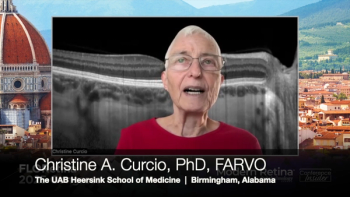
Investigating better indications and outcomes in laser refractive surgery
Prof. Martin Dirisamer speaks with Editor Caroline Richards about his ESCRS instructional course, "Mastering laser refractive surgery: Indications and outcomes."
Video transcript
Note: This transcript has been lightly edited for clarity.
Caroline Richards: So thank you for joining me, Professor Dirisamer. I understand you participated in an instructional course on refractive surgery. I'm Caroline, editor of Ophthalmology Times Europe, and I would love to hear more about the key takeaways from that instructional course.
Prof. Martin Dirisamer:Thanks for the kind invitation to talk to you. Yeah, what we tried to say or to transport in this instructional course, are, where are the limitations and indications for the specific treatment options we have in refractive, in modern refractive surgery, either with laser refractive surgery or lens based surgery like phakic IOLs or refractive lens exchange.
Richards: Excellent. And what would you say the main challenges are that people have to pay attention to?
Dirisamer:Yeah, since we get more and more precise pre-operative assessments, we get nicer and very precise devices based on different technologies like OCT-based, or like, [audio unclear]-based, and also epithelial mapping, for example. So there are many, many parameters for refractive surgeons have to keep in mind and have to look into their decision whether the patient gets refractive surgery and which kind of refractive surgery. This is very important since this kind of an elective procedure. So there's no medical need for that. You have to be more precise, and rule out the suspicious cases. That sounds easy, but it's tricky.
Richards: A lot of thought has to go into it.
Dirisamer:Exactly, there's not really a certain rule. Now you can really say, Okay, this is safe or it's not safe. There are some, but it remains the decision by the surgeon what we do.
Richards: And I suppose with more experience, it becomes easier to...
Dirisamer:Exactly.
Richards: ...decide which way to go for...
Dirisamer:Exactly.
Richards: ...which patient.
Dirisamer:And it's, of course, an individual decision for each surgeon because someone may feel more comfortable with this technology, the other one with the other techniques. So we try to cover the latest publication and latest scientific works and see what changed.
Richards: Yes, yeah.
Dirisamer:There are some changes. So we are very happy to have epithelial mapping. So this is a tool that it's getting more precise to rule out suspicious corneas.
Richards: Yeah.
Dirisamer:Yeah, I think we are getting close to zero complication rates.
Richards: That's excellent.
Dirisamer: But it's never zero.
Richards: No, but close enough. I was going to ask you what you're most excited about in the field, but I would imagine it's epithelial mapping. Or is there anything else?
Dirisamer: Well, in terms of diagnostic, I think epithelial mapping is pretty, pretty cool. But there was a biomechanical measurements, which are coming more and more in terms of surgical techniques. I think the SMILE technique, which is a femtosecond laser lenticule extraction, I think this becomes the future of cornea and refractive surgery. Yes. Many, many companies are now providing this technique. So let's developing tool we have in our armamentarium.
Richards: Yeah, yeah. How long, how long has that been around now? It's just a few years, isn't it?
Dirisamer: It's more than 10 years.
Really? Wow. Time flies
Dirisamer: More than 10 years. Yeah, we probably see next year or so hyperopic treatments for SMILE and cyclotorsion compensation and so on. So this, yeah I'm looking forward to that.
Richards: Professor Dirisamer, that was really interesting. Thank you very much for sharing your insight.
Dirisamer: Thank you, too.
Newsletter
Get the essential updates shaping the future of pharma manufacturing and compliance—subscribe today to Pharmaceutical Technology and never miss a breakthrough.




























